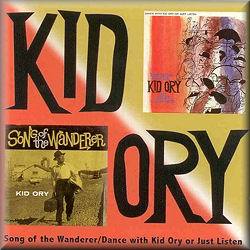Song of the Wanderer
1. Song of the Wanderer
2. Tailgate Ramble
3. Mahogany Hall Stomp
4. Baby Won't You Please Come Home
5. St. Louis Blues
6. Toot Toot Tootsie (Goodbye)
7. Sheik of Araby
8. Tiger Rag
Dance with Kid Ory or Just Listen
9. Am I Blue?
10. Fidgety Feet
11. Hindustan
12. Twelth Street Rag
Kid Ory - Trombone, vocal (track 7)
Marty Marsala - Trumpet, vocal (track 7)
Darnell Howard - Clarinet
Cedric Haywood - Piano
Frank Haggerty - Guitar
Charles Oden - String bass
Earl Watkins - Drums
Recorded in 1957 on August 25th and 26th and October 27th in Los Angeles, California.
These tracks were originally issued on a pair of LP's on the Verve label back in the days when "Dixieland" was deemed commercially viable and most of the major labels put out LP's in the genre. However, two cuts from the Dance with Kid Ory or Just Listen album, namely Ja Da and Dinah, were excluded, undoubtedly because of time constraints. The original liner notes for Song of the Wanderer by Nat Hentoff, jazz critic and former columnist for Down Beat and other journals, are reprised in the booklet; and while there are also notes included for Dance with Kid Ory or Just Listen, I assume they were added by Mike Pointon as my copy of the Verve LP has none.
Kid Ory's first retirement from the music scene occurred during the Depression, and he did not emerge again until 1943 when a revival of Dixieland music was getting underway. From then until his second retirement in 1966, Ory continued to lead a band from his base on the West Coast. Although the personnel of his band varied throughout this time, he always managed to achieve an "Ory sound," regardless of who was in the group. In part this was due to his own trombone style-what is sometimes referred to as "tailgate"-comprised of a guttural tone, often achieved through the growls he made, often through a mute, and the frequent glissandi where he would slide both from the bottom up and the top down. On this disc, Mahogany Hall Stomp nicely illustrates this Ory trademark style.
As to the rest of the front line, Marsala's trumpet is clean and forceful, touching all registers and range, but not dwelling for long in the upper. In similar fashion Howard spends a good deal of time in the middle register on clarinet, but he can-and does-handle the upper and lower registers where it is appropriate, as in Sheik of Araby, for instance.
Another element of the "Ory sound" is the part played by the rhythm section. Ory eschews the banjo and tuba, opting rather for guitar and string bass, and 4-beat rather than 2-beat, the guitar chording rather than playing single string. The resulting pulse is further complemented by Watkins drumming here, as he relies almost entirely on playing softly on hi hat or ride cymbal, using the rest of the set mainly for accents. While this rhythmic pulse can be heard on almost any track, it is very clear on Baby Won't You Please Come Home and Fidgety Feet, underscoring the band's facility with dynamics as they work on a rising volume in the out-choruses leading to the coda.
In this latter stage of his musical life, Ory did not stay with the ensemble approach that is so central to the New Orleans style, the one on which he cut his music teeth and followed largely until his first "retirement." Instead in this second stage he adopts the approach of his fellow New Orleanean, Louis Armstrong, who perhaps more than any other musician introduced the soloing that became so prominent thereafter. So on this CD we find the tunes being given the ensemble-solos-ensemble treatment. That is not to imply that interest suffers as a result of this pattern (as is too often the case). The front line musicians and pianist have something to say; and that, coupled with the backing that soloists are often given by the others, particularly where they take a second chorus, keeps up the intensity. However, the ensemble choruses are so stimulating that I wish there were more of them, even at the expense of solos.
Other than the piano, the rhythm instruments take very few solos or none. Watkins does add a 4-bar drum tag to several tunes, e.g. Tailgate Ramble, Hindustan, and others, but his only full-fledged solo is on the last tune, Twelfth Street Rag. Here Watkins plays a typical New Orleans solo-all pressed rolling on the snare drum with nice rim shot accents throughout, no tom tom patterns or cymbal crashes. Guitar and bass are also given solos here, each backed by stop time from the other instruments (as is the drum solo also). This last track neatly sums up the entire performance provided by this CD as it gives everyone a moment in the sun and includes just about everything that would make a blindfolded listener say, "That's the Kid Ory band."
While the absence of Ja Da and Dinah is unfortunate, it is good to have available on CD the rest of the tracks of the two LP's-some 75 minutes of fine jazz. Perhaps they will be included on a future CD release as there are several other Verve LP's that feature the Ory bands waiting for reissue on CD-especially if they are given transfers as outstanding as those on this disc!
Bert Thompson
